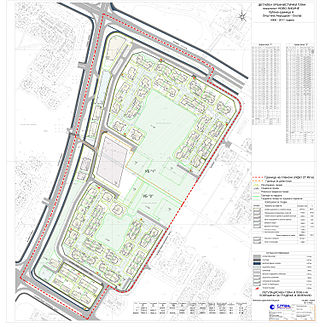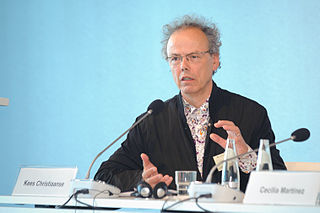
Spatial planning mediates between the respective claims on space of the state, market, and community. In so doing, three different mechanisms of involving stakeholders, integrating sectoral policies and promoting development projects mark the three schools of transformative strategy formulation, innovation action and performance in spatial planning

Femke Halsema is a Dutch politician and filmmaker. On 27 June 2018, she was appointed Mayor of Amsterdam and began serving a six-year term on 12 July 2018. She is the first woman to hold the position on a non-interim basis. She previously was a member of the House of Representatives for the leftist green party GroenLinks from 1998 to 2011, and served as the party's parliamentary leader from 2002 to 2010.
Wim C. Turkenburg is emeritus professor 'Science, Technology & Society' (STS) at Utrecht University, the Netherlands, and owner of a consultancy on energy and environmental issues. He is member of the board of the Foundation Preparation Pallas reactor as well as member of some advisory and programming committees on issues ranging from nuclear waste management and the safety of nuclear power plants and natural gas exploitation to RD&D programming in the field of bioenergy and biomaterials. In addition he communicates regularly on energy issues in public media.

Pieter Winsemius is a retired Dutch politician of the People's Party for Freedom and Democracy (VVD) and businessman.

The Netherlands Architecture Institute (NAI) was a cultural institute for architecture and urban development, which comprised a museum, an archive plus library and a platform for lectures and debates. The NAI was established in 1988 and was based in Rotterdam since 1993. It ceased to exist in 2013, when it became part of Het Nieuwe Instituut.

The Ministry of Housing, Spatial Planning and the Environment was a Dutch ministry. It was responsible for policies on public housing, spatial planning, the environment and the housing of national government agencies. It was merged with the Ministry of Transport, Public Works and Water Management into the new Ministry of Infrastructure and the Environment on 14 October 2010.
Simin Davoudi FAcSS is Professor of Environmental Policy and Planning at Newcastle University. She is Past President of the Association of European Schools of Planning (AESOP) and, as coordinator of the Planning Research Network, advised the Department of Communities and Local Government on its research priorities until 2007. Currently, she is a member of the DCLG Expert Panel on Housing market and Planning, and is expert advisor for the DG Environment of European Commission for Urban Environment.

Jerome (Jerry) Ravetz is a philosopher of science. He is best known for his books analysing scientific knowledge from a social and ethical perspective, focussing on issues of quality. He is the co-author of the NUSAP notational system and of Post-normal science. He is currently an Associate Fellow at the Institute for Science, Innovation and Society, University of Oxford.

Wilhelmus "Winy" Maas is a Dutch architect, landscape architect, professor and urbanist. In 1993 together with Jacob van Rijs and Nathalie de Vries he set up MVRDV.

Kees Christiaanse is an architect and urban planner from the Netherlands. After working with Rem Koolhaas, he started two firms, KCAP in 1989 and Architects and Planners in 1990, where he was a partner till 2002. Christiaanse has "tackled some of the highest profile urban design schemes in the Netherlands, hosting buildings by" the finest Dutch and several international architects.

The Earth System Governance Project is a long-term, interdisciplinary social science research programme originally developed under the auspices of the International Human Dimensions Programme on Global Environmental Change. It started in January 2009.

Francine Marie Jeanne Houben is a Dutch architect. She graduated with cum laude honours from the Delft University of Technology. She is the founding partner and creative director of Mecanoo architecten, based in Delft, The Netherlands.

Eduardus Hermannus Theresia Maria Nijpels is a Dutch politician of the People's Party for Freedom and Democracy (VVD) and nonprofit director.
Shiv Visvanathan is an Indian academic best known for his contributions to developing the field of science and technology studies (STS), and for the concept of cognitive justice, a term he coined. He is currently Professor at O P Jindal Global University, Sonepat. He was Professor, Dhirubhai Ambani Institute of Information and Communication Technology (DA-IICT), Gandhinagar, India and has held the position of Senior fellow Center for the Study of Developing Societies (CSDS) in Delhi He has also taught at the Delhi School of Economics. He has held visiting professorships at Smith College, Stanford, Goldsmiths, Arizona State University and Maastricht University, Harvard University & Oxford University. He is author of Organizing for Science, A Carnival for Science and has co-edited Foulplay: Chronicles of Corruption. He has been consultant to the National Council of Churches and Business India.
Johannes Gerardus Franciscus (Jan) Veldhuis is a Dutch administrator/governor in the fields of scientific education and research, healthcare and culture, nationally and internationally. His last post was president of Utrecht University, from 1986 until 2003. He still holds various part-time governance positions.
Earth system governance is a recently developed paradigm that builds on earlier notions of environmental policy and nature conservation, but puts these into the broader context of human-induced transformations of the entire earth system.
The International Architecture Biennale Rotterdam (IABR) is a bi-annual international event bringing together international knowledge and experience in various design disciplines, and presenting this knowledge and experience to a broader audience.
The "argumentative turn" refers to a group of different approaches in policy analysis and planning that emphasize the increased relevance of argumentation, language and deliberation in policy making. Inspired by the "linguistic turn" in the field of humanities, it was developed as an alternative to the epistemological limitations of "neo-positivist" policy analysis and its underlying technocratic understanding of the decision-making process. The argumentative approach systematically integrates empirical and normative questions into a methodological framework oriented towards the analysis of policy deliberation. It is sensitive to the situative context and the multiple kinds of knowledge practices involved in each stage of the policy process, drawing attention to different forms of argumentation, persuasion and justification.

Urban planning, also known as town planning, city planning, regional planning, or rural planning, is a technical and political process that is focused on the development and design of land use and the built environment, including air, water, and the infrastructure passing into and out of urban areas, such as transportation, communications, and distribution networks and their accessibility. Traditionally, urban planning followed a top-down approach in master planning the physical layout of human settlements. The primary concern was the public welfare, which included considerations of efficiency, sanitation, protection and use of the environment, as well as effects of the master plans on the social and economic activities. Over time, urban planning has adopted a focus on the social and environmental bottom-lines that focus on planning as a tool to improve the health and well-being of people while maintaining sustainability standards. Sustainable development was added as one of the main goals of all planning endeavors in the late 20th century when the detrimental economic and the environmental impacts of the previous models of planning had become apparent. Similarly, in the early 21st century, Jane Jacob's writings on legal and political perspectives to emphasize the interests of residents, businesses and communities effectively influenced urban planners to take into broader consideration of resident experiences and needs while planning.
The Universiteiten van Nederland (UNL) is, since November 2021, the new name of the Vereniging van Universiteiten. The UNL is a trade group of ten government-funded universities, three special universities, and the Open University of the Netherlands. It formed as the Vereniging van Samenwerkende Nederlandse Universiteiten in 1985, as a successor to the Academische Raad.












